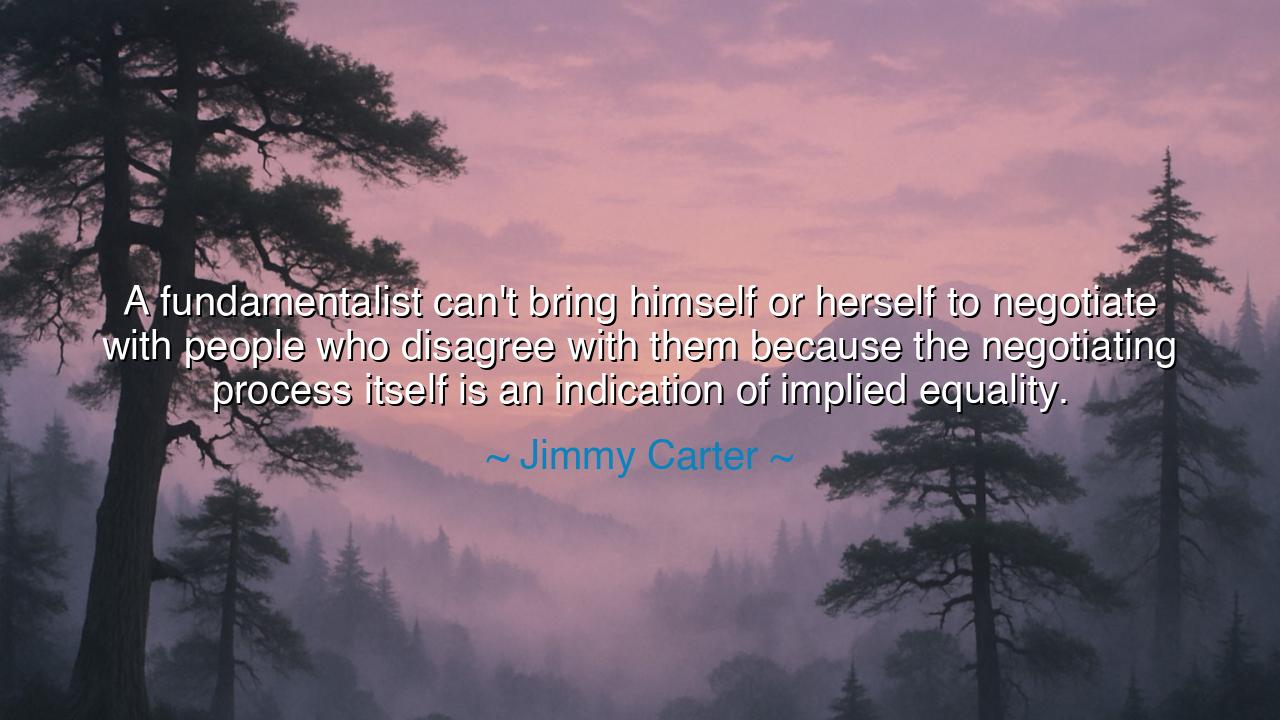
A fundamentalist can't bring himself or herself to negotiate with
A fundamentalist can't bring himself or herself to negotiate with people who disagree with them because the negotiating process itself is an indication of implied equality.






“A fundamentalist can’t bring himself or herself to negotiate with people who disagree with them because the negotiating process itself is an indication of implied equality.” Thus spoke Jimmy Carter, the peacemaker-president, the farmer-philosopher who walked humbly yet spoke with the clarity of a prophet. His words strike at the heart of human conflict, revealing why so many wars—of faith, of politics, of ideology—refuse to end. In this sentence lies a truth carved from the bedrock of wisdom: that true dialogue requires humility, and humility cannot dwell in the heart that believes itself divinely superior. To negotiate is not to surrender, but to recognize the humanity in one’s opponent—to see that another’s mind, though different, is worthy of respect.
Carter’s insight was born of both experience and suffering. As a man of deep faith, he understood the fire that belief can inspire, but he also knew how that same fire, untamed, can consume compassion. In his life’s work—whether mediating peace between Egypt and Israel or challenging injustice within his own nation—he saw how fundamentalism, in any form, refuses the equal table. For the fundamentalist, whether religious or political, truth belongs not to all but to them alone. To negotiate, then, is impossible, for negotiation assumes that two sides might each hold part of the truth. It implies that both are equal before reason, and therein lies the offense to the mind that claims divine monopoly.
This blindness is as ancient as civilization itself. When men cease to see others as their equals, they cease to see them as human. History bears witness: the wars of creed that drowned continents in blood, the empires that crushed dissent beneath the banner of righteousness, the purges and inquisitions that burned thought upon the altar of purity—all sprang from the same poisoned root: the refusal to recognize equality. To negotiate is to admit that one might be mistaken, that wisdom may dwell even in the heart of an adversary. But the fundamentalist cannot endure such doubt, for his faith is built not on love of truth, but on fear of error.
Consider the story of the Camp David Accords, that fragile yet miraculous peace brokered by Carter in 1978 between Egyptian President Anwar Sadat and Israeli Prime Minister Menachem Begin. These two leaders came from nations that had fought and bled for generations. Yet in the quiet halls of Camp David, they sat together, argued, and wept. It was not easy, for each carried the weight of their people’s pain. But they negotiated—and in that act of mutual recognition, they affirmed the equality of their humanity. Sadat himself would pay for that act of peace with his life, slain by extremists who saw dialogue as betrayal. Yet his courage proved Carter’s words: to negotiate is to stand among equals, and only those free from fanatic pride can bear that sacred burden.
What Carter calls “implied equality” is the foundation of all freedom. It is the understanding that no soul, no nation, no creed holds the whole of light. To speak with another as equal is to honor the divine spark that burns in both. This is not weakness, as the proud might say, but the greatest strength—the strength to listen, to understand, and to yield when truth demands it. For the man who believes he is always right becomes his own tyrant, enslaved by his certainty. The one who listens, however, becomes a vessel of wisdom, for through others, he learns the vastness of truth.
Carter’s warning is not only for fanatics of faith, but for all who live in an age of division. In politics, in religion, even in the home, how often do we turn from dialogue, preferring victory to understanding? We must remember that negotiation is not weakness; it is civilization itself. It is the bridge between hearts, the road by which peace travels. Every time we sit and speak with respect to those who differ, we affirm that sacred equality upon which all democracy and decency rest.
So, my listener, take this teaching as a shield against the arrogance of certainty. When you meet one who disagrees, resist the urge to conquer; seek instead to understand. When you speak, speak not to dominate, but to build. When you listen, listen as though wisdom might enter through the mouth of another. For in that act, you honor the divine truth that Carter saw—that we are, beneath all names and nations, equals, and that peace is born not from conquest, but from the courage to share the table.
Let this be your practice: to walk with conviction, but without contempt; to hold faith, but never hatred; to speak your truth, yet leave space for another’s. For the day you refuse to negotiate, you close the door to your own growth. And the day you open your heart to implied equality, you become not just a peacemaker, but a keeper of wisdom, standing among those who have learned the highest art of humankind—the art of understanding.






AAdministratorAdministrator
Welcome, honored guests. Please leave a comment, we will respond soon